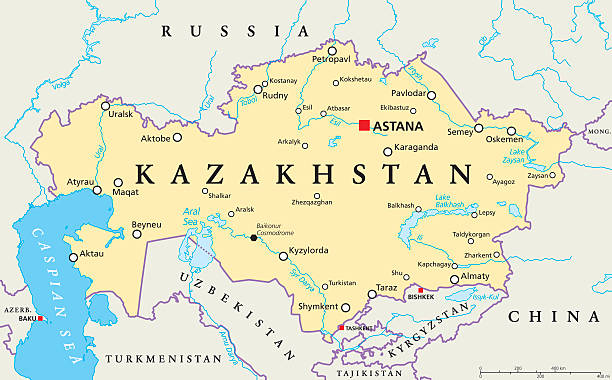Xi Jinping Engages With Kazakhstan
Kazakhstan is a major player in energy and metallurgy as well as being a vital link between China and the West.
China’s President, Xi Jinping, is in Astana, the Kazakhstan capital, to meet with Kazakhstan’s President Kassym-Jomart Tokayev for talks before both head to the Shanghai Cooperation Organisation Heads of State summit taking place in Samarkand on Thursday. (September 15). It is Xi’s first trip out of China since the beginning of the covid pandemic. Astana has reverted back to its original name after spending three years known as ‘Nur-Sultan’ after the previous President, Nursultan Nazarbayev. His successor – Tokayev – changed the name back to Astana by Presidential decree and an amendment to the Kazakh constitution yesterday.
Kazakhstan is a strategic move as it was here that Xi first described China’s ambition to develop ‘One Belt, One Road’, in 2013, which has now morphed into the significantly larger Belt & Road Initiative.
Kazakhstan remains a strategic choice following the launch of the Belt & Road Initiative, it shares a major border with China’s Western Xinjiang Province, and is a transit vehicle for goods travelling to and from China to all points West, including Europe. Kazakhstan also possesses large amounts of mineral wealth, which are largely undeveloped. The country possesses 30% of the world’s chrome ore reserves, 25% of manganese ore, 10% of iron ore, 5.5% of copper, 10% of lead and 13% of zinc, making the country a vital source of component minerals used in hi-tech metallurgy. Kazakhstan also houses 40% of the world’s uranium, an important resource as emerging countries are looking to nuclear power plants to deliver energy.
China is a large part of Kazakhstan’s multi-vector foreign policy. Under this, Kazakhstan actively engages with China, Russia, Turkey, the European Union, the United States, and other countries to ensure it avoids falling dependent on any one major power. As part of this approach, Kazakhstan enjoys member status in the United Nations, the Organization for Security and Co-operation in Europe (OSCE), the Organization of Islamic Cooperation (OIC), the Organization of Turkic States (OTS), the Collective Security Treaty Organization (CSTO), and the Eurasian Economic Union (EAEU), as well as in the Shanghai Cooperation organization.
It should be noted that President Tokayev is an experienced diplomat and has held senior political positions in Kazakhstan for many years, in addition to serving as the Director-General of the United Nations office in Geneva for two years from 2011 to 2013. His experience is vital in assisting Kazakhstan develop as an emerging power within Central Asia. Kazakhstan is also a vital part of China’s overland trade route ambitions and is a profitable destination for Chinese investors, and especially those involved in transportation and logistics.

Kazakhstan’s geographical location and close economic ties make it a focal point for China’s overland economic ambitions, with Beijing wanting to develop the ‘Road’ part of the BRI as a hedge against any future problems with Taiwan in the East China Sea, an issue that if a military conflict arose, would create maritime problems. The continuing development of a major supply chain artery via Kazakhstan is a primary aim for Xi to achieve.
Kazakhstan joined the BRI in 2013 shortly after its unveiling in what was then Nur-Sultan. Kazakhstan joined the Beijing initiated Asian International Investment Bank (AIIB) in 2014, further boosting economic ties with Beijing and opening channels to receive numerous BRI, China financed investment development projects. There are currently 21 BRI projects underway in Kazakhstan, valued at US$12.07 billion. China is among the top five largest foreign investors in Kazakhstan, while there are approximately 700 Kazakhstan-Chinese joint ventures in the country.
China and Kazakhstan do not have a Free Trade Agreement, but China has signed a non-preferential FTA with the Eurasian Economic Union, which includes Kazakhstan along with Russia and Kyrgyzstan in Asia. That leaves the door open for China to bilaterally agree specific tariff reductions on trade specifics with Astana, and this will probably occur at these meetings.
Bilateral trade has also been growing. In July 2022 China exported US$1.66 billion and imported US$1.5 billion from Kazakhstan, illustrating a well-balanced trade structure. Between July 2021 and July 2022, Chinese exports to Kazakhstan increased by 10.7%, while imports from Kazakhstan increased by 19.5%. Total bilateral trade over the past twelve months amounted to US$30.16 billion, it can be expected to reach close to US$40 billion this year.
Trade tends to be complimentary, with Kazakh minerals being exported to China and China exporting clothes and telecommunications. Kazakhstan is a major supplier of Crude Petroleum, Radioactive Chemicals, Copper Ore, Refined Copper and Ferroalloys to China.
Xi and Tokayev are expected to discuss the strengthening of multifaceted bilateral strategic partnership, while numerous bilateral documents are also expected to be signed. We will summarize their meetings here as details emerge.
Related Reading





